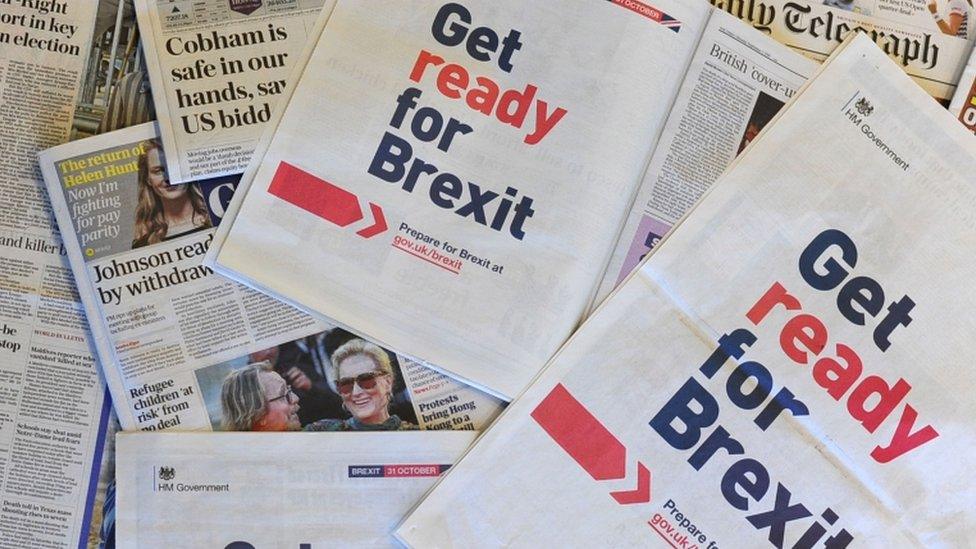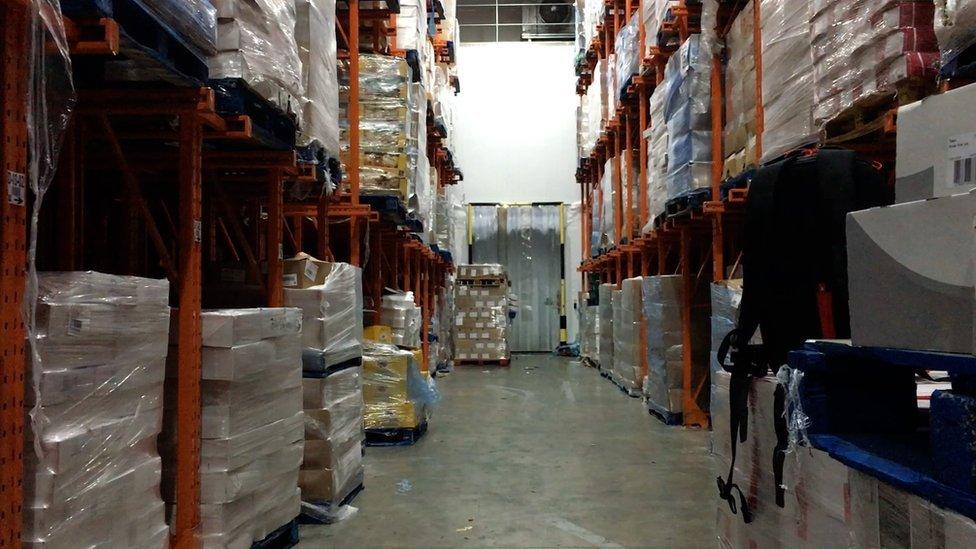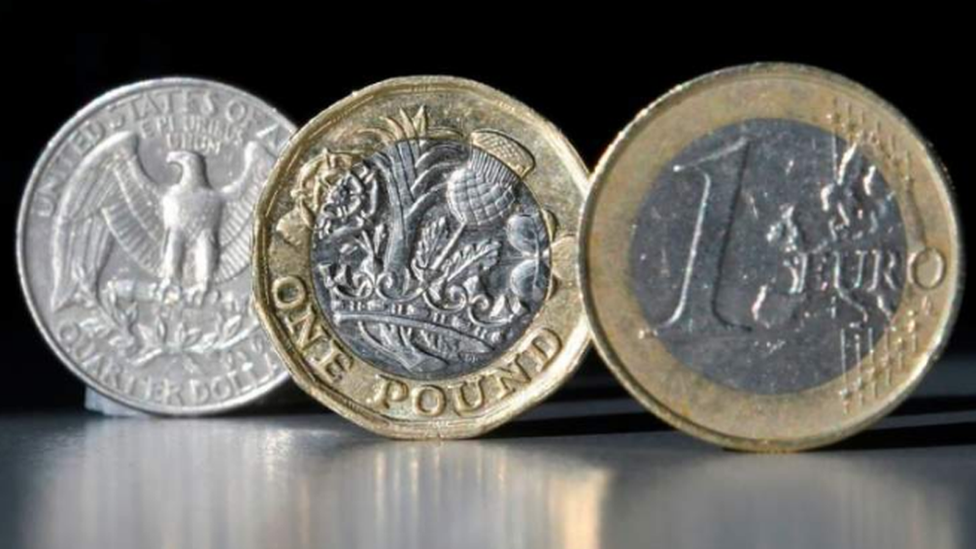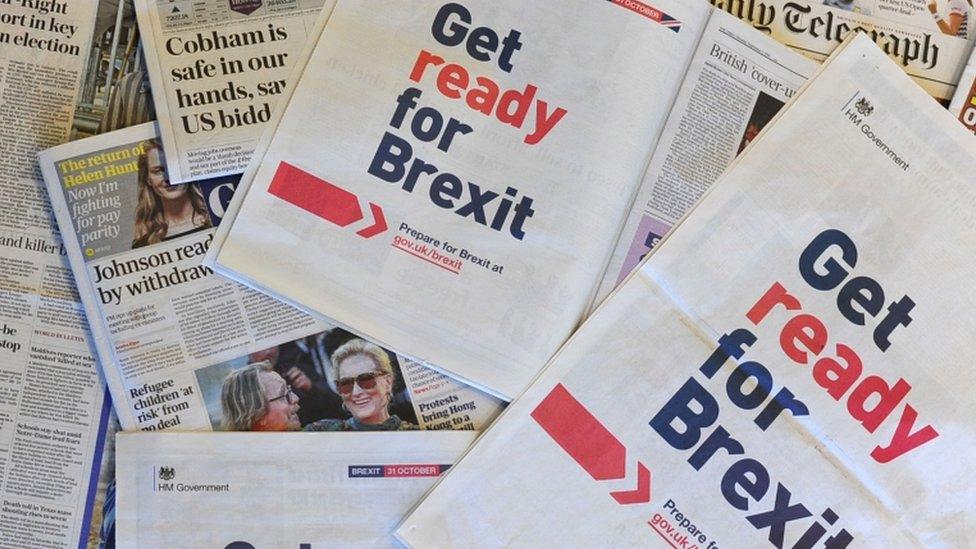The mounting cost of Brexit
- Published

Adverts in national newspapers on Monday told the public to "prepare" for Britain's exit from the EU
An advertising campaign about Brexit looks more political and electoral than helpful to business.
The chief economist at the Scottish government has updated the cost of Brexit uncertainty in business investment, adding half a billion pounds to projections.
Scottish consumer confidence remains weak, and Gary Gillespie reports that import decline has been far greater than an export boost since sterling fell.
The price being paid for Brexit is already eye-watering. The latest wheeze is to spend up to £140m telling us to be prepared.
For what? Stocking up on olive oil? Buying a German or French car while you can still afford one? The UK government's advertising campaign doesn't say.
The message seems to be more relevant to businesses. Well, three points about that:
Being prepared for no deal is very different from being prepared for a smooth transition with minimal changes to trading arrangements. And no amount of expensive advertising can provide an answer on which it is to be.
It's very hard not to conclude that a large amount of taxpayer moola is being blown on a pre-election campaign aimed at voters, not businesses, driving home the message that the Boris Johnson administration is determined to get out on 31 October "come what may, do or die". That's a political message.
What will the National Audit Office, the Electoral Commission, the courts and, yes, even the Taxpayers Alliance have to say about this use of public funds? Serial litigator Gina Miller and her ilk will surely want to tie the government in knots.
Update on uncertainty
That's just part of the government cost of preparations. Far more significant for the economy is the cost in lost potential.
We've got an update today from the Scottish government's chief economist, Gary Gillespie, reckoning that the latter is getting substantially higher.
His team has updated an analysis carried out at the start of last year, looking at the impact on business investment of uncertainty around Brexit.
The findings suggest that continuing uncertainty is adding a further half billion pound shortfall in the business investment than could otherwise be expected.

Companies stockpiled goods in the first quarter, and then again in Q3
The reckoning early last year was that the impact of a Brexit shock was a drop of £1.3bn in business investment in the quarter we're now in, gradually reducing as trading conditions become clearer.
But that reduction in the Brexit shock-induced shortfall is nothing like as clear as it should have been by now. The half billion pound shortfall, added in the latest re-working of the numbers, takes the reduced business investment close to £1.4bn next quarter and the one after that, reducing to £1.2bn in the second quarter of 2020, and still £500m down in the first quarter of 2021.
'Less spent on supply chain'
What does that mean? Well, it doesn't seem to be such a problem with foreign investors. Funds from them have been flowing into real estate, thanks to the weakness of sterling making assets look cheap.
More significant for the economy is that less is being spent on the supply chain of capital goods. There's a consequent loss of capital stock, down 1% already, and pushing towards 2% by the end of next financial year.
Through that, there is a shortfall in the productivity improvements that new investment ought to bring.
And to remind you: productivity - output per hour worked - may not be everything, but if we're to get better off, it's nearly everything.
Stockpiling, unwinding and stockpiling again
Dr Gillespie is among those to be relaxed about the prospect of the next quarter of gross domestic product figures meaning we're in recession.
The contraction in total economic output of 0.3% for the April to June quarter, announced on Wednesday, was slightly sharper than the UK as a whole (0.2%).
But it seemed to follow a similar pattern - stockpiling in the first quarter of the year, in preparation for Theresa May's March deadline, pre-postponement, then unwinding the stockpile in Q2.
The distillers and pharma firms that were biggest into stockpiling in Q1 seemed to be the fastest to cut production in Q2.
The indications for the UK economy suggest things have picked up in Q3. That's possibly because stockpiling is under way again, in anticipation of 31 October (this, in case you were wondering, is no way to run a business or an economy).
Trading places
There's another observation from Dr Gillespie's State of the Economy report that points to the real cost of Brexit.
If you earn in sterling, you're worse off when you go abroad on holiday, and when you buy imports - not just that German or French car, but a lot of your food and consumer goods, while your fuel is priced in US dollars.
Against the euro, we're 15% worse off. Against the US dollar, it's 17%. Now, that should be good news in boosting exports. British firms, and their workers, benefit from being more competitive when they sell overseas.
That's one of the simpler concepts in Higher Economics. Yet it isn't working that way.

We are worse off against the Euro and even worse against the dollar, which should have been good news for exports
The International Monetary Fund has looked at this, and found that a weakening of a currency has only a modest impact on boosting exports. A country's trade balance sees more of an impact from fewer imports.
That's what we're now seeing in Scotland, according to Dr Gillespie: export growth, already weak, has barely changed, while the rate of growth of imports fell around the time of the 2016 EU referendum, to below that of exports.
There's a way of measuring the impact of currency depreciation, by comparing the outcome with what might have been otherwise.
Scottish government economists conclude that the trade deficit would have been about £4.4bn by the start of this year, whereas it appears to have been nearer £2.3bn. Almost all of that is explained by lower imports rather than higher exports.
Pessimists ahead
Consumer sentiment, meanwhile, remains under water, which is where it took the plunge at the time of the Brexit referendum and where it has remained since.
This relatively new indicator of Scottish economic activity tells us that Scots are particularly negative about the prospects for the Scottish economy. Comparing the upbeat with the downbeat, the pessimists have it by a 19 point margin.
But ask people about the security of their own household finances, and the optimists come out ahead, by four percentage points.
Businesses tend to say something similar: they are more positive about their own prospects than about those of the economy generally. But even the positivity about a company's own prospects reached a zero balance in the most recent business survey.
Brexit is not the only cloud on the horizon. Tariff skirmishes, trade hostilities and slowdown in growth across Europe and the USA are also causing concern and slowing up investment.
But with Brexit, the UK - Scotland included - is paying a particularly high economic price for its political choices.
- Published2 September 2019

